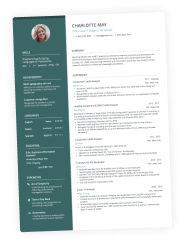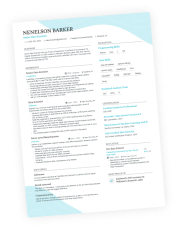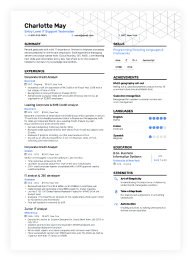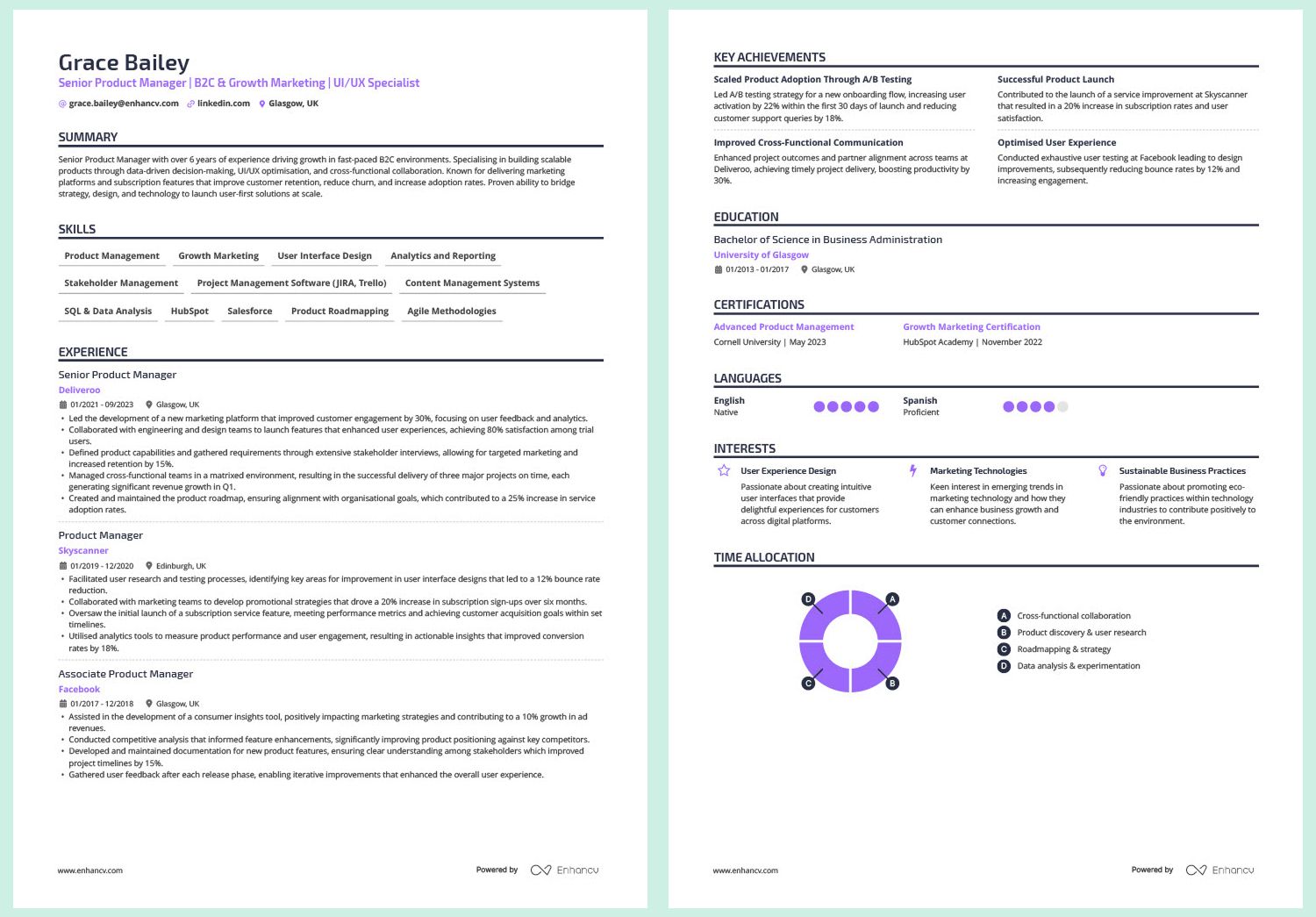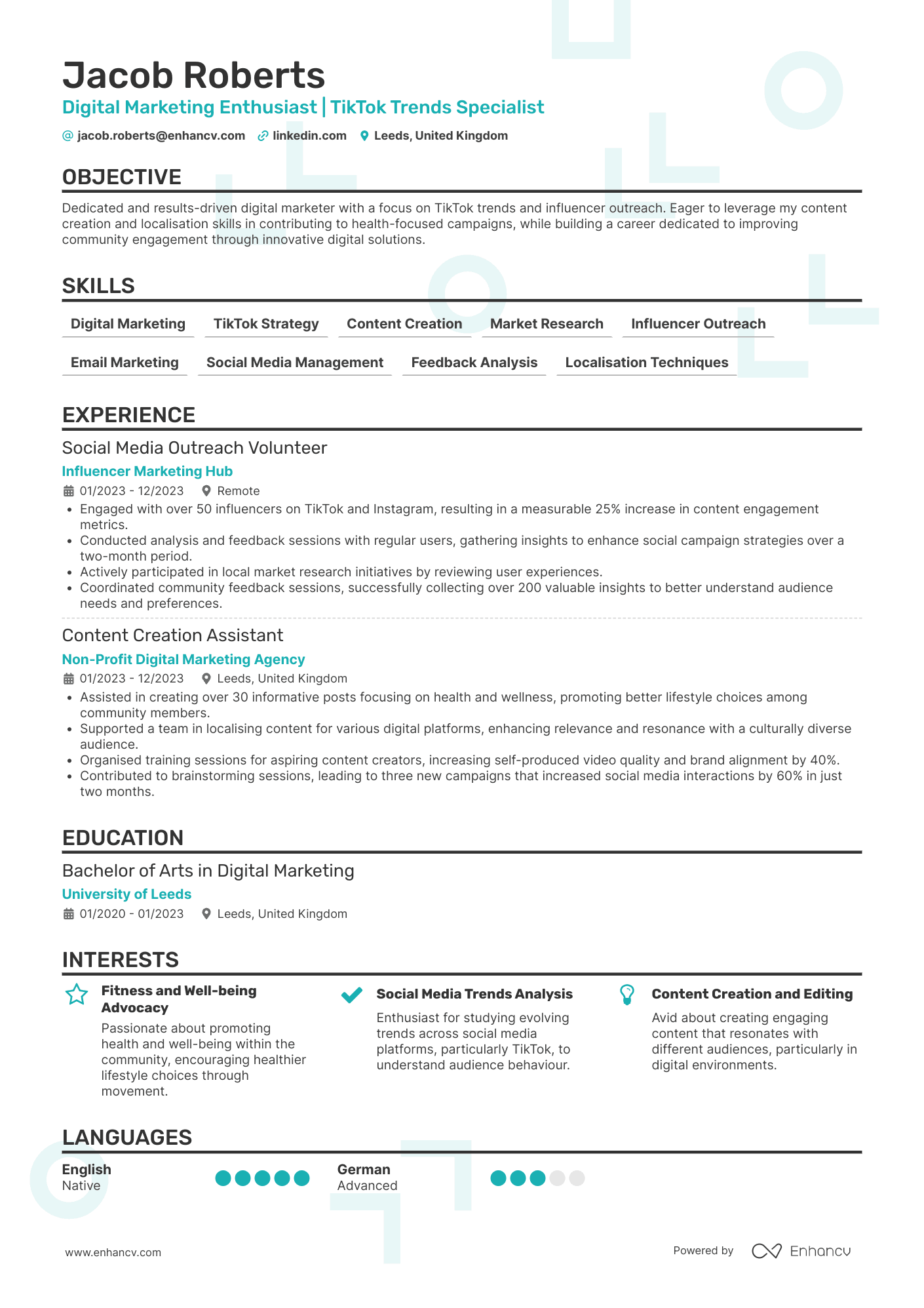You have seconds to impress a hiring manager. If your CV is too short, you’ll leave out what matters. Too long, and you’ll lose their attention. Just like Goldilocks, you’re aiming for something that’s just right.
How long should a CV be in the UK? Deciding whether to create a one-page CV, a two-page CV, or a longer one can feel overwhelming. But it doesn't have to be. The answer depends on a few factors, including your career level, industry, and how you’re applying.
Ready to get moving? Let’s walk you through the decision-making process.

Key takeaways
- A two-page CV hits the sweet spot between detail and clarity for most professionals.
- However, there are some key exceptions to this rule, such as academic and executive-level roles.
- Be selective. It’s important to focus on recency and relevancy to the vacancy at hand.
- Keep the formatting clear, simple, and skimmable for the best results.
How long should a CV be in the UK?
In the UK, a two-page CV is the norm. This is the CV length hiring managers expect to see. It gives you the right amount of space to share your skills, experience, and education with the reader.
For most professionals, two pages is ideal. It gives you enough room to show relevant experience and accomplishments without overwhelming the reader. The key is that every section should serve a clear purpose; no fluff, no filler.
Of course, there are notable exceptions to this rule. Every candidate is different, with different levels of experience and goals. There may be a good reason to use a longer or shorter CV length.
For example, if you’re a recent graduate, early-career professional, or a career changer with limited experience, a one-page CV may be a better call.
It doesn’t end there. Applying to certain industries—for example, academia, science, or high-level executive roles—may demand a longer CV. If you legitimately have more to say about your career history, don’t sell yourself short. Feel free to take the space you need.
If you have 15+ years of experience, or have worked across multiple regions, industries, or functions, a three-page CV is absolutely acceptable, especially in more senior or technical roles.
Let’s take a look at some good CV examples:
Two-page CV example
One-page CV example
Understanding which CV length is right for your application could be the key to your success.
If you’re unsure where to start, use our CV Checker and see if your current CV can stand up to the test of hiring software.
Is your resume good enough?
Drop your CV here or choose a file. PDF & DOCX only. Max 2MB file size.
Up next, we take a look at the factors you should consider when deciding.
What influences the ideal CV length?
Don’t presume that CV length is a one-size-fits-all game. It’s not. When you’re deciding how long your CV should be, there are three main factors to consider.
Let’s break them down:
Career stage
How long have you been working in this industry? Your career stage will often determine how long your CV should be. The longer you’ve been working, the longer your CV may be.
Average CV length by career stage
| Career stage | CV length |
|---|---|
| Entry-level (or recent graduate) | Aim for a one-page CV that covers your main points. |
| Mid-level | Your CV can be up to two pages as long as all of the information you share is relevant. |
| Executive level | Most of the time, executive-level roles will still be two pages. However, if you have tons of experience, you can go up to three pages. Note: It’s rare for CVs of any kind to go over the three-page mark. You might need to edit it down. |
Industry norms
Let’s face it, a journalism CV is unlikely to look the same as an academic one. It’s important to tailor your CV to the industry you’re in. Pick the right length based on your field.
Average CV length by industry
| Type of industry | CV length |
|---|---|
| Academia or research | CVs are often three or more pages long. You likely have more to say than you can fit on a two-page document—what with the many awards, publications, and studies you’ve completed. |
| Corporate or creative | In these sectors, you may have a one-page CV or two pages at the most. |
| Public sector | You may have to submit a two-page CV along with supporting documents and information. |
Application method
As all job seekers know, there are loads of different ways to apply for roles and each one may call for a slightly different approach when it comes to CV length and formatting.
Average CV Length by Application Method
| Submission method | CV length |
|---|---|
| Recruiter or hiring manager | These professionals are busy-bees. Keep your CV as short and to-the-point as possible.* *Without leaving out the good stuff, of course. |
| Job boards | Applying via a job board? Your CV length may matter less. You can usually submit up to two pages. If the board uses an Applicant Tracking System (ATS), using a skimmable CV is essential. |
| LinkedIn Easy Apply | Your CV should be between one and two pages long, attached as a PDF, and optimised for quick scanning. |
Think about each of these factors, and decide which one matters the most. If in doubt, we generally recommend going for a two-page CV as this suits most professionals.
How long is an ATS-friendly CV?
Applicant tracking systems help hiring managers sort applications. However—contrary to what you may have heard—they don’t automatically reject CVs before a human lays eyes on them.
Your CV length should not influence how you rank in the ATS. Make sure your CV is ATS-friendly by keeping it clear, easy to read, and skimmable.
Being concise shows you respect the reader’s time—and that you can communicate with clarity and focus.
If your most relevant experience is buried under unnecessary detail or a dense format, it might never be seen.
One-page CV vs. two-page CV: What’s best for you?
It’s decision time: which will you choose? You might already know. But if you’re still scratching your head, let’s sum up.
Here’s a rundown of when each of these CV lengths work.

When a one-pager works
- You’re a newbie: You’re new to the workforce and lack work experience.
- You’re a career changer: You’re switching careers and want to highlight your transferable skills.
- You need a brief CV: You’re applying for a role that values brevity, e.g. startups.
- You’re using a functional format: Functional CVs tend to be one-page long.

When you need a second page
- You’re experienced: Say, you have 5+ years of relevant experience in the industry.
- You’ve got a lot to say: Your impact and achievements need space to breathe.
- You need to add context: You’re applying in a field where context matters—management, marketing, healthcare, etc.
- You’re aiming high: You’re going for a top-level role and need to prove your worth.
A two-page CV gives space to demonstrate value—but only if every section earns its place. Don’t make the mistake of filling your application with “fluff”.
What to include and what to leave out of a CV
You’ve got the basics down—you have an idea of how long your CV should be. But, how can you make sure it fits? Knowing what to keep and what to cut is an artform in itself.
Must-haves (for any CV length)
Deleting valuable information will get you nowhere fast. Yes, there are some CV sections that are must-haves.
Let’s take a quick look.
Contact details
Every application needs to have contact details such as your name, phone number, and email address. Include these in your CV header.
Professional summary
Your professional summary is a snapshot of your top skills, experience, and (sometimes) education. It’s your chance to make a big impression on the hiring manager.
Key skills
The skills section of your CV is quick and skimmable. (Bonus: It doesn’t add much to the CV length!) You can also add the proficiency level for each competency you share.
Work history
Be selective about the positions you list on your CV. Your work history should be tailored to the position for which you’re applying.
- •Increased customer engagement by 25% through data-driven campaign targeting.
- •Managed a £2M annual marketing budget and reduced spend inefficiencies by 15%.
- •Collaborated with creative, product, and data teams to optimise seasonal campaigns.
- •Developed and scheduled social media content, boosting follower growth by 40%.
- •Analysed user engagement to refine strategy for BBC iPlayer campaign.s
- •Created email marketing flows using Mailchimp and Adobe Campaign.
Education
Next, you’ll need to include a detailed list of your education on your CV. Add your formal schooling along with any extras—such as professional certificates.
Don’t skip any of these CV sections. You need to make sure the hiring manager has enough information about your professional history.
What to cut if your CV is too long
Looking to make some all-important cutbacks? We’ve got you covered. While you don’t want to leave out any of the core CV sections, there are plenty of things that might clutter your application.
Irrelevant jobs or tasks
Your CV space is valuable. Don’t waste it by including a bunch of irrelevant tasks (or even jobs!) that fail to tell the hiring manager anything.
Let’s take a look at a poor example for a teaching CV—and why it doesn’t work:
- •Opened and closed the till using the store’s POS system.
- •Refilled printer ink cartridges and made sure paper trays were stocked.
- •Carried stockroom boxes weighing up to 15kg and helped with seasonal decorations.
- •Tidied shelves and aligned all products to face forward on display.
- •Assisted colleagues during their breaks by watching the shop floor.
The above roles have no clear connection to teaching. So, the hiring manager would have no clue whether this candidate could do the job at hand well.
Equally, the bullet points are vague and don’t offer any metrics or true value. There’s no mention of transferable skills which could help career changers break into the world of teaching.

PRO TIP
Edit your CV for the job at hand! If a line doesn’t support the job you’re applying for, consider cutting or rephrasing it.
Long paragraphs with no measurable impact
Hint: Hiring managers don’t have time to read a wall of text. And they won’t bother. Don’t make the mistake of writing long paragraphs that do nothing for your application.
This is a common CV mistake and it won’t do you any favours. The hiring manager would find it hard to get the information they need from the above example.
Bullet points make your CV easier to scan quickly, which is critical during initial reviews. Paragraphs tend to hide achievements.
Each bullet point should highlight what you did, how you did it, and what the impact was—ideally with metrics.
Outdated tech or tools
The working world moves fast… and if you don’t, you’re going to get left behind. Bragging about using outdated tech or tools makes you look like a dinosaur. Cut it out.
Hobbies
Think the hiring manager cares that you love knitting? Think again. Unless the hobby is relevant to the role or shows obvious skills (such as people skills!), it’s unlikely to impress them.
So, if you’re looking for a way to trim down your CV, consider leaving out the hobbies section.
References
Chances are, you learnt to include references on your CV when you were back in school. But times have changed. You should only add these to your application if the job advert requests them.
Nowadays references tend to happen much later in the hiring process. Leave them off your CV but have them lined up and ready to go in case the hiring manager requests them.
How to decide what’s worth keeping
Deciding which parts of a CV hold value is your number one priority. Don’t drop the ball. Think about which information will wow the hiring manager.
Your CV should be a targeted, easy-to-read summary of your most relevant experience—not a complete career history.
Whether it’s one page or three, every line should add value and bring you closer to the interview.
Since you have limited space, you need to prioritise some pieces of information over others. To help you do that, use the simple framework: relevance > recency > prestige.
Top priority: relevance
Every nugget of information on your CV should be relevant to the job listing. If it doesn’t show the hiring manager that you’re perfect for this vacancy, it’s a waste of time and space.
#1 Check your content is relevant
- Cut out any positions that don’t align directly with the vacancy at hand. For example, if you’re applying to be a nurse, your experience as a content writer is not relevant.
- Include roles that are the same as—or similar—to the position you’re going for. This shows the hiring manager you have what it takes.
- If you don’t have direct experience, list similar positions and focus on transferable skills.
Second priority: recency
How recent is the experience you’ve shared? If it’s older than 10-15 years, it may not be relevant to your current job hunt. Consider cutting out older positions to make room for newer ones.
#2 Prioritise recent experiences
- Focus on the roles you’ve held most recently. As a general rule, you should include your last three to four positions.
- Listing your first part-time job is unlikely to wow the hiring manager—especially if you’re 10 years into your career.
- Make extra space on your CV by leaving out older positions that don’t add value. Ask yourself: Is this a key part of my story—or just filler?
Third priority: prestige
The third factor that you want to consider is prestige. Having some major players on your CV is a quick way to stand out from the crowd.
#3 Add in some prestige
- Don’t be afraid to name-drop companies or brands, especially if they’re impressive. This is a quick way to catch the hiring manager’s attention.
- Similarly, include any training or certificates you have from well-known providers.
Are there exceptions to the CV length rule?
The short answer is yes. While we recommend a two-page CV in most cases, there are some exceptions, including the following:
Academia, medicine, research
These CVs tend to be longer, especially if they include publications, teaching experience, grants, etc. You can afford to extend your CV to make space for these impressive feats.
Executive-level roles
You don’t become an executive overnight. So, it’s likely that you’ve had a long career history leading up to this point. Three pages is acceptable here as long as it’s valuable.
International CVs
Applying to work abroad? Some countries—such as Germany and India—expect longer CVs with more detail. Do your research first. It’s important to know what the local expectations are.

PRO TIP
Longer CVs are only effective when they’re well-structured and add value with every section.
Best practices for CV length and formatting

Best practices
- Get the spacing on point. Keep formatting clean and margins reasonable (ideally between 0.5 and 1 inch (1.3–2.5 cm) on all sides). This makes your CV easier to read.
- Avoid blocks of text. Use bullet points, not long paragraphs when describing your achievements.
- Make sure it’s scannable. Prioritise white space and scannability when designing your CV. Use our simple CV builder to get it right.
- Tailor your CV to the role. Switch up the content for each job—not every CV should be the same length.

PRO TIP
Most hiring managers spend less than 20 seconds scanning a CV—make every section count.
Conclusion
Getting your CV length right doesn't have to be hard. Use the pointers we’ve shared in this guide to help you nail it from the start. Remember the number one rule: every part of your CV needs to tell the hiring manager something new and valuable. Stick to that, and you’ll go far.

